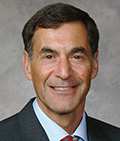FAER Academy of Research Mentors Workshop
Monday, 2:10-4:10
Hall H

Mervyn Maze, M.B.Ch.B.
The path to becoming an independent scientific investigator will be explained for both mentors and trainees during the FAER Academy of Research Mentors Workshop, tomorrow from 2:10 to 4:10 p.m. in Hall H.
During the session, four speakers will discuss:
- What needs to be completed before a trainee becomes independent.
- The opportunities to transition to independence in U.S. training programs.
- Funding opportunities through the National Institutes of Health (NIH).
- How a clinical researcher traverses the pathway to scientific independence.
“We want the trainee to understand what has to be accomplished during mentored training,” said Mervyn Maze, M.B.Ch.B., session moderator and former chair of the Department of Anesthesia and Perioperative Care at the University of California, San Francisco (UCSF). “A key feature will be to learn about the funding options available through the NIH.”
The speakers will be:
- David S. Warner, M.D., Vice Chair of Research and Professor of Anesthesiology at Duke University Medical Center, Durham, North Carolina, who will present “Too Little, Too Much — What Are the Consequences.” He has a long career in neuroscience research and has been a leader in the care of patients with cerebrovascular disease.
- Judith Hellman, M.D., Vice Chair for Research and Professor of Anesthesia at UCSF, will present “Models of Pathways to Scientific Independence.” Dr. Hellman has studied vascular biology and how it relates to infection in the lungs.
- Alison E. Cole, Ph.D., is Program Director in the Division of Pharmacology, Physiology and Biological Chemistry at the NIH’s National Institute of General Medical Sciences, Bethesda, Maryland. She will address NIH funding in “Funding Mechanisms Designed to Transition Along the Pathway to Scientific Independence.”
- Lee A. Fleisher, M.D., is Chair of the Department of Anesthesiology and Critical Care and Professor of Anesthesiology at the University of Pennsylvania. He will present “A Pathway to Scientific Independence for Trainees Planning to Pursue a Career in Clinical Research.” He has been influential in comparative effectiveness research and establishing clinical guidelines through scientific evidence or clinical trials.
